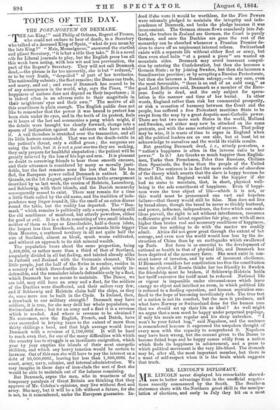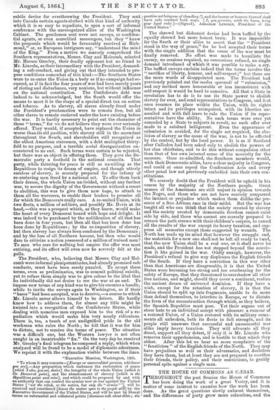But Denmark, argue the men, who in weariness of the
MR. LINCOLN never displayed his remarkable shrewd- subtle device for overthrowing the President. They sent into Canada certain agents clothed with that kind of authority which it is so easy to repudiate, to open a sort of informal conference with the unrecognized allies of the Washington Cabinet. The gentlemen sent were not envoys, or confiden- tial agents, or even accredited messengers, but they "knew the proposals which would be favourably received at Rich- mond,' or, as European intriguers say, "understood the mind of the King." From a motive we scarcely comprehend the Southern representatives, Messrs. Clay and Holcomb, selected Mr. Horace Greeley, their deadly opponent but no friend to Mr. Lincoln, as their intermediary with the President, demand- ing a safe conduct, and giving out that they intended to pro- pose conditions somewhat of this kind:—The Southern States were to re-enter the Union in a body as if no campaign had oc- curred, as if in fact the four years of war had been merely years of rioting and disturbance, very noxious, but without influence on the national constitution. The Confederate debt was indeed to be acknowledged, but the South would offer the means to meet it in the shape of a special direct tax on. cotton and tobacco. As to slavery, all slaves already freed under the President's proclamation were to remain free, but all other slaves to remain enslaved under the laws existing before the war. It is hardly necessary to point out the character of these "terms," for we do not believe they were ever seriously offered. They would, if accepted, have replaced the Union in worse than its old position, with slavery still in the ascendant throughout the South, and slaveholders still recognized as the ablest American statesmen, with a debt multiplied thirty- fold to no purpose and a terrible social disorganization en- countered to no end. Such terms were certain to be rejected, but there was an object in offering them. They gave the De- mocratic party a foothold in the national councils. That party, while thirsting for peace is still as unwilling as the Republican to resign its dream of empire, and though utterly careless of slavery, is scarcely prepared for the infamy of re-enslaving men freed by a national act. To offer them back their dream, the whole Union undivided, without any further war, to secure the dignity of the Government without a resort to abolition, this was to give them new hope to attach to them all the waverers, to enable their leaders 10 promise all for which the Democrats really care. A re-united Union, with two fleets a million of soldiers, and possibly Mr. Davis at its 'head,—this was a prospect which, as they knew, would make the heart of every Democrat bound with hope and delight. It was indeed to be purchased by the nullification of all that has been done in four years, but then all that has been done has been done by Republicans ; by the re-imposition of slavery, but then slavery has always been condoned by the Democrats ; and by the loss of all Northern honour, but then who would dare to criticize a nation possessed of a million of trained men? To men who care for nothing but empire the offer was most enticing, and its effect will even now be severely felt at the polls.
The President, who, believing that Messrs. Clay and Rol. .comb were informal plenipotentiaries, had already promised safe conducts, must have been sorely puzzled. To accept these terms, even as preliminaries, was to commit political suicide, yet to refuse them simply was to give colour to the libel that he individually did not desire to see the war at an end. To impose new terms of any kind was to give his enemies a handle, while to invite the envoys again to Washington, as if their "bases" had been accepted, was to deceive —a course to which Mr. Lincoln never allows himself to be driven. He hardly knew how to address them, for almost any title might be twisted into a recognition of the Confederate States, while dealing with nameless men exposed him to the risk of a re- pudiation which would make him very nearly ridiculous. There is, too, a touch of not undignified pride in the old workman who rules the North ; he felt that it was for him to dictate, not to receive the terms of peace. The situation was a difficult one, but the Western lawyer is not often caught in an inextricable "fix." On the very day he received Mr. -Greeley's final telegram he composed a reply, which when analyzed will be found to be a model of diplomatic adroitness. We reprint it with the explanation visible between the lines.
"Executive Mansion, Washington, 18th. "To whom it may concern—[Envoys or unaccredited persons, whichever
Esare],—Any proposition which embraces the restoration of peace hich I also, you see, desire] the integrity of the whole Union [which is Democrat point], and the abandonment of slavery [whh is the Republican point and mine], and which could be proposed by and with an authority that can control the armies now at war against the United States [ ' not the rebels, or the nation, but only the "armies"), will be received and considered [leaves the matter open to the people still] by the Executive Government of the United States, and will be met by liberal terms on substantial and collateral points [dismisses talk about debts, the
question not being one of chandlery 1], and the bearer or bearers thereof shall have safe conduct both ways. [I, you perceive, settle the bases, being your legal ruler.] —(Signod), Anaemic Lwow.; President of the United States."
The shrewd but dishonest device had been baffled by the equally shrewd but more honest brain. It was impossible for the South or their allies to assert that the "President stood in the way of peace," for he had accepted their terms with the single addition that the cause of the war must be finally removed. No effort was made to humiliate the enemy, no cessions required, no concessions refused, no single demand introduced of which it was possible to make a cry. The baffled envoys exclaim indeed that the terms involve the "sacrifice of liberty, honour, and self-respect;" but these are the mere words of disappointed men. The President bad previously pointed out the modes operandi of "submission," and any method more honourable or less inconsistent with self-respect it would be hard to conceive. All that a State in. revolution has to do is to use its State power to abolish slavery for ever, and send representatives to Congress, and it at once resumes its place within the Union, with its rights intact and its privileges unimpaired, with its liberties un- assailed and with full leave to rule the Union if its repre- sentatives have the ability. No such terms were ever yet conceded by a State to subjects in revolt, no such offer ever made to a subdued belligerent. Even the appearance of submission is avoided, for the single act required, the abo- lition of slavery as the cause of the war, is not to be effected • by the central, but by the local power. It is as if Scotland after Culloden had been asked only to abolish the powers of her clan chieftains, and to do this without compulsion other than that of her own internal sense of the necessity for the measure. Once re-admitted, the Southern members would, with their Democratic allies, have a clear majority in Congress, and could at once repeal the Confiscation Acts and every other penal law not previously embodied into their own con- stitutions.
We scarcely doubt that the President will be upheld in his course by the majority of the Northern people. Great masses of the Americans are still unjust in opinion towards the Negro, and those who are not have scarcely conquered the instinct or prejudice which makes them dislike the pre- sence of a free African race in their midst. Bat the war has taught all who can think that the society created by slavery and the society created by democratic freedom cannot exist side by side, and those who cannot are scarcely prepared to retrace the path strewn with their children's corpses, to cancel all the results of the war except its heavy taxation, and sup- press all memories except those suggested by wounds. The North has made up its mind that however the struggle end, the materials for a new one shall not be left all ready to band, that the new Union shall be a real one, or it shall never be made, and the President has not stepped beyond the convic- tion it htts gained in the war. Oddly enough, however, the President's refusal to give way displeases the English friends of the South. If they have a conviction in this war other than that Americans are disagreeable, it is that the United States were becoming too strong and too overbearing for the- safety of Europe, that they threatened to overshadow all other free nations, and might, should they cover a continent, realize the ancient dream of universal dominion. If they have a wish, except for the retention of slavery, it is that the Union should be split up into fragments, unable to do more than defend themselves, to interfere in Europe, or to dictate the form of the reconstruction through which, as they believe, the Spanish Republics must pass. Yet their organs out of sheer hate to an individual accept with pleasure a rumour of a restored Union, of a Union restored with its military arma- ments all unbroken, both its fleets in full strength, and its people still unaware that successful and unsuccessful war alike imply heavy taxation. They will advocate all they dread, support all they detest, if only it is Mr. Lincoln who removes their apprehension, and is hostile to that which they abhor. After this let us hear no more complaints of the " fanaticism " of the English friends of the North. They may have prejudices as well as their adversaries, and doubtless they have them, but at least they are not prepared to sacrifice their friends, their policy, and their convictions, to gratify personal spite against a single man.































 Previous page
Previous page